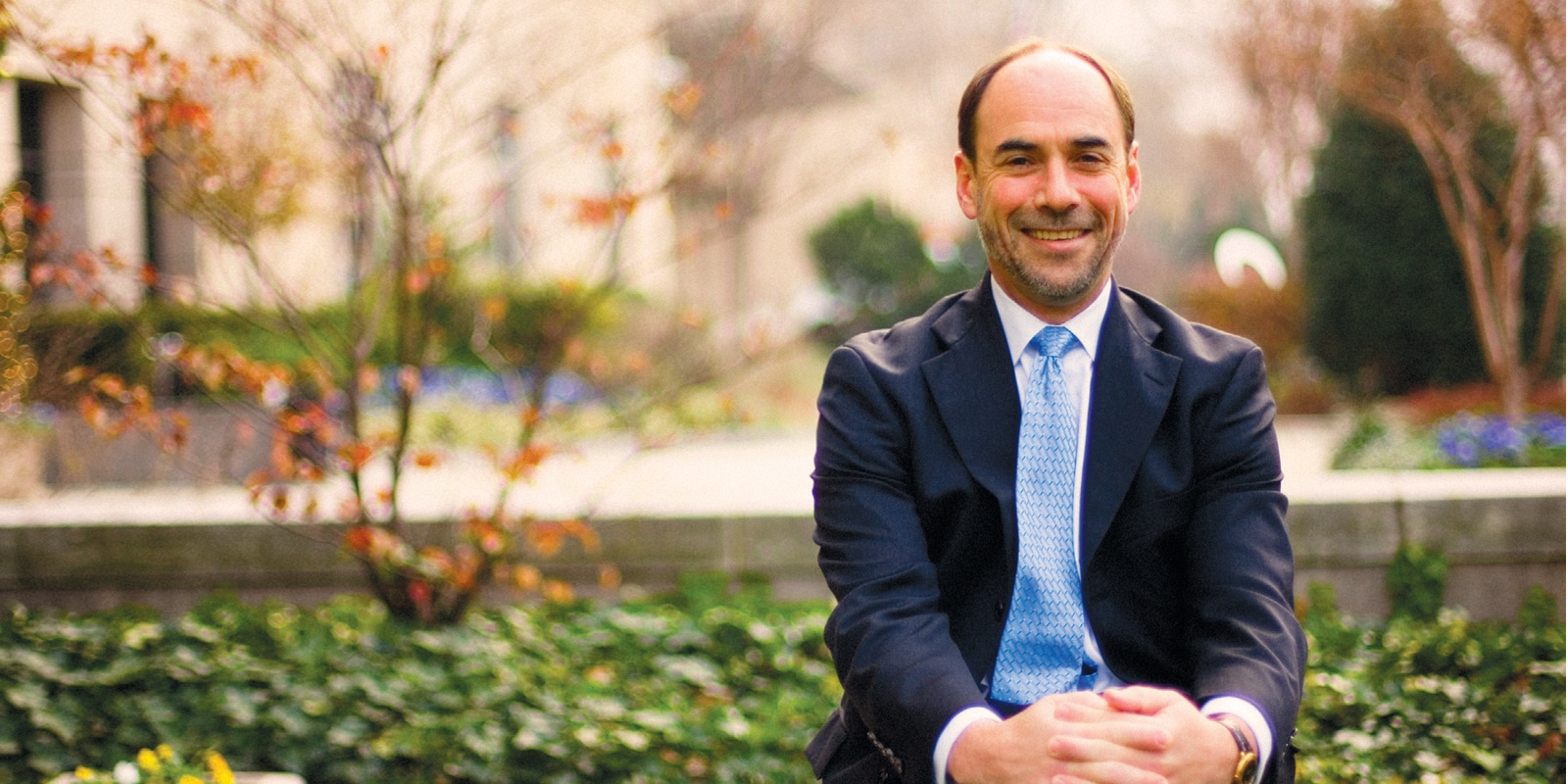
Click, pause. Click, pause. Click, pause. On a busy morning at the Council on Foreign Relations (CFR), a nonpartisan think tank in Washington, DC, the faint echo of a mouse button being pressed repeatedly, almost frantically, rises above all other sounds coming from the bright, austere of?ce of economist Douglas Holtz-Eakin.
Though generally a fan of President Bush, he wasn’t afraid to criticize Republican policies. Nor was he himself immune to criticism. “Idiot” and “devil” were two of many titles regularly applied to him by legislators who seemingly didn’t appreciate Holtz-Eakin’s uninhibited honesty.

When Holtz-Eakin walked to work around 6:30 a.m. this morning (like many in
Washington, he doesn’t own a car), he planned his day assuming the announcement would arrive mid-afternoon, not mid-morning. Now he has to rearrange his schedule, or rather, get his research assistant, Chad Waryas, a recent graduate of Trinity University, to do it for him. “Chad runs my life,” Holtz-Eakin says. “I start fires and he puts them out.”

Now the phone is ringing every few minutes, and each time, it’s a reporter from a major media outlet: USA Today, the Wall Street Journal, the New York Times, the Los Angeles Times, Nightly Business Report, MSNBC, CNBC. He’s surprised when he doesn’t get a call from the Financial Times.

 The day before the de?cit announcement, Holtz-Eakin took part in a panel discussion at the National Press Club. The topic was the role annuities might play for Baby Boomers in conjunction with Social Security. It was a fairly dull affair, for the most part, and Holtz-Eakin had confessed earlier to having little interest in the subject. The last to speak, he listened patiently, ?dgeting in his chair, shuf?ing papers, and taking notes while two fellow economists dryly quoted reams of ?gures supporting their case for greater reliance on annuities. Then he took the podium and lobbed his grenade: the problem with Social Security is beyond annuities to ?x. “We have to have greater imagination,” he said. “The stakes are, in fact, quite high.” As he continued with what he called “soft criticism,” he was the only speaker to evoke both applause and laughter.
The day before the de?cit announcement, Holtz-Eakin took part in a panel discussion at the National Press Club. The topic was the role annuities might play for Baby Boomers in conjunction with Social Security. It was a fairly dull affair, for the most part, and Holtz-Eakin had confessed earlier to having little interest in the subject. The last to speak, he listened patiently, ?dgeting in his chair, shuf?ing papers, and taking notes while two fellow economists dryly quoted reams of ?gures supporting their case for greater reliance on annuities. Then he took the podium and lobbed his grenade: the problem with Social Security is beyond annuities to ?x. “We have to have greater imagination,” he said. “The stakes are, in fact, quite high.” As he continued with what he called “soft criticism,” he was the only speaker to evoke both applause and laughter.
Probably that’s because he comes off like a regular guy. Holtz-Eakin grew up in Pittsburgh and rural Illinois. To this day, he still holds a fondness for his hometown and other Midwest Rust-Belt cities struggling to ?nd their place in the 21st-century economy.
He admits his decision to attend Denison wasn’t particularly well informed. Lots of other kids from his area were attending at the time, and he found the campus attractive. That, and he wanted to run competitively, but knew he wasn’t fast enough for the track team at a larger school. But running wasn’t really his calling, anyway. A freshman-year injury laid him low for a while, and by his sophomore year, he had given up competitive running.
A double-major in math and economics, Holtz-Eakin was far more immersed in the emerging field of computer programming. But he still hadn’t settled on any clear path. Then one of his professors recommended him for the Oak Ridge Science Semester, a special program affiliated with the Oak Ridge National Laboratory in Tennessee. “It was just to get me out of town,” he quips. It ended up being a pivotal experience. His project there involved economic modeling. Finally, something had really captured his interest. “It explains the nature of social decision-making,” he says, when asked why he became an economist. “It’s really about how we allocate resources and who gets what. In the end, it’s very practical.”
 Practicality, as it turns out has guided most of his major decisions to date. Princeton university, where both his father and brother had attended, offered Holtz-Eakin a free ride to graduate school, and he took it. There was an adjustment period, beginning with flunked math exams. “It was a cultural difference,” he explains. “I wasn’t ready.” But he studied hard and blossomed in the program, earning his Ph.D. with a dissertation that outlined ways for municipal governments to weather business cycles. His first job was teaching at columbia university, where he found the atmosphere disheartening.
Practicality, as it turns out has guided most of his major decisions to date. Princeton university, where both his father and brother had attended, offered Holtz-Eakin a free ride to graduate school, and he took it. There was an adjustment period, beginning with flunked math exams. “It was a cultural difference,” he explains. “I wasn’t ready.” But he studied hard and blossomed in the program, earning his Ph.D. with a dissertation that outlined ways for municipal governments to weather business cycles. His first job was teaching at columbia university, where he found the atmosphere disheartening.
Students were too independent and most of the professors were deeply absorbed in private research. “I had a crisis of confidence,” he says. “I had the sense that it was all sort of pointless. It was a lonely enterprise.” Right about this time, a friend from Princeton, economist Harvey Rosen, went to work in the first Bush administration. Holtz-Eakin joined him there in 1989, advising the president for the next 16 months. He was hooked. applying economics to real-world situations in real time was his passion. “The problem, I realized, wasn’t what I was doing but how I was doing it.” at the time, Holtz-Eakin was married to Heidi Holtz ’80 and they had two young children, Eleanor and colin. Seeking an environment more family-friendly than Washington, he accepted a position with Syracuse university, ultimately chairing its economics department.
Only a few days into the job, he went to the hospital with flu symptoms. The diagnosis was actually far more serious: a block in his renal artery had caused his right kidney to shrink, resulting in a pronounced spike in blood pressure. His Syracuse colleagues thought they’d given him a heart attack already. Rather, a serious car accident during his senior year at Denison had left him with a renal artery disorder. It took angioplasty and eventually a unique transplant (he was both the donor and recipient) of his kidney to fix the problem.
Twelve years into his Syracuse tenure, in 2001, Holtz-Eakin got a call from Glenn Hubbard, chairman of President George W. Bush’s council of Economic advisers, inviting him back to Washington to serve as chief economist. By that point, he says, “I was ready.”
Once again, though, he started off with an emergency. Shortly after joining the council, Holtz-Eakin hurt his ankle and had to use crutches. Then came September 11. Holtz-Eakin remembers fleeing his office with his colleagues after learning the Pentagon had been hit. “All hell broke loose,” he recalls. “I couldn’t run, but I crutched as fast as I could.” A few days later, the council produced an eight-page memo reassuring the president the economy would survive the disruption.
Back in the fold of Washington, Holtz-Eakin held to his principles, delivering economic news without partisan spin. Though generally a fan of President Bush, particularly his top-down style of leadership, he wasn’t afraid to criticize Republican policies. Nor was he himself immune to criticism. “Idiot” and “devil” were two favorites of many titles regularly applied to him by various senators and congressmen who seemingly didn’t appreciate Holtz-Eakin’s uninhibited honesty.
Not everyone was unhappy. President Bush pulled Holtz-Eakin aside during a White House Christmas party and thanked him for his candor. That brief encounter was the prelude to the biggest break in Holtz-Eakin’s career—his appointment at the Congressional Budget Office in 2003. He became the first person in history to land there straight from the White House.
“There is no doubt he is a straight shooter,” Robert Reischauer, director of the CBO from 1989 to 1994, told the New York Times. “What you look for is someone who sees himself as wanting to be judged by the quality of his work rather than the number of his well-connected friends. I was very glad he was chosen for the job.”
 Time at the budget office passed quickly. Life revolved around the Congress, which often entailed long days and even longer nights. Big battles, he says, took place over relatively minor expenditures, pet projects for which individual representatives had strong feelings. Of course, there were not-so-minor expenditures, too, such as the administration’s proposed prescription drug benefit. “I lived that for three years,” Holtz-Eakin says. “It was an heroically impossible task, evaluating an insurance product that didn’t exist in nature.” Throughout that period, he insisted on delivering his opinions in private. “I always felt that on the tough calls, I should deliver the news myself. It’s only fair.”
Time at the budget office passed quickly. Life revolved around the Congress, which often entailed long days and even longer nights. Big battles, he says, took place over relatively minor expenditures, pet projects for which individual representatives had strong feelings. Of course, there were not-so-minor expenditures, too, such as the administration’s proposed prescription drug benefit. “I lived that for three years,” Holtz-Eakin says. “It was an heroically impossible task, evaluating an insurance product that didn’t exist in nature.” Throughout that period, he insisted on delivering his opinions in private. “I always felt that on the tough calls, I should deliver the news myself. It’s only fair.”
The one time he didn’t follow that rule, he got in trouble with his mother. The CBO had issued a tax report that generated partisan wrangling, and he had been taken to task by Chicago Sun-Times columnist Robert Novak. The next thing Holtz-Eakin knew, he was on the phone with his mother, calming her down after she’d had to defend her son from her friends.
Like everyone in a high-profile government position, Holtz-Eakin attracted his share of eccentrics. for years, he recalls, a woman in North Carolina forwarded her monthly electric bill to him. Prison inmates sent him passionate but futile pleas for DNA tests. Another complete stranger once sent him a rambling, nonsensical document of nearly a thousand pages.
By contrast, his proudest achievement at the budget office, a response to Hurricane Katrina, was only a few pages long. In the days leading up to the disaster, Holtz-Eakin called an emergency meeting and demanded that his office produce a timely, level-headed prediction of winter 2006–07 the storm’s likely effects on the economy. “That was the CBO at our best,” he says.
By law, Holtz-Eakin’s term at the CBO was slated to last four years, until 2007. Then, in late 2005, while waiting on a flight at Laguardia airport in New York, he ran into Richard Haass, president of the Council on foreign Relations. The chance meeting led to Haass offering him a job as head of the CfR’s new greenberg Center, devoted to exploring the intersection between economic policy and national security.
It was an offer he couldn’t refuse, not only for the prestige but also for the higher salary to support two children, both of whom are now in college. His daughter is a freshman at American university and his son is a senior at Swarthmore. As it happens, Holtz-Eakin has produced at least one democrat, and an active one at that. Colin served as the internet director for democratic Congressman elect Joe Sestak of Pennsylvania.
 Back in his office, in between interviews about the deficit, Holtz-Eakin has plenty to say on other burning economic issues. He still dislikes current tax policy, saying the system encourages corporations to move overseas, when businesses should be given every reason to move here from other countries. War with Iran? It would be economically feasible, a miniscule allotment compared to just a year of Social Security spending, but it would still force cuts in other areas of the federal budget. If he were in charge, he’d eliminate the department of Energy. (“What have they ever done?” he asks.) “But waste and inefficiency are not political terms. You have to make them political, explain who’s affected by it, why it’s worth it…. Otherwise, we’ll displace all the advantages we’ve built up since the Cold War.”
Back in his office, in between interviews about the deficit, Holtz-Eakin has plenty to say on other burning economic issues. He still dislikes current tax policy, saying the system encourages corporations to move overseas, when businesses should be given every reason to move here from other countries. War with Iran? It would be economically feasible, a miniscule allotment compared to just a year of Social Security spending, but it would still force cuts in other areas of the federal budget. If he were in charge, he’d eliminate the department of Energy. (“What have they ever done?” he asks.) “But waste and inefficiency are not political terms. You have to make them political, explain who’s affected by it, why it’s worth it…. Otherwise, we’ll displace all the advantages we’ve built up since the Cold War.”
In the end, though, Holtz-Eakin is an optimist. He believes the necessary steps will be taken, eventually—once there’s no other choice. It’s now 1:30 in the afternoon. Seven hours into his day, Holtz-Eakin hasn’t had any lunch, and he’s starting to look a little ragged. But he’s still got a speech to write and at least two television interviews to tape before he can go home and flip on some Tricia Yearwood. His daughter is in town, too, and he’s excited to see her. Resting his brain for a moment, Holtz-Eakin pauses to watch some television, turning up the volume when he comes across a channel replaying footage from the president’s press conference earlier that morning. Analyzing the president as if he were an economic report, Holtz-Eakin can’t help but see the bigger picture. The man looks old, he says. But he can sympathize. His own beard had no white in it before he returned to Washington either. Now it’s a distinguished silver.
Continuing this reverie, Holtz-Eakin thinks back fondly to the college summer he spent hammering railroad spikes and imagines whether he should have made that his career. There’d be less stress, that’s for sure. But it wouldn’t have made him one of the nation’s leading economists. The phone rings again. It’s the crew from Nightly Business Report. They’re ready for him in the TV room.
Editor’s note: Holtz-Eakin did finally have that meeting regarding Senator John McCain’s presidential bid. In January, he left the Council on Foreign Relations and signed on as economic policy consultant for the senator’s presidential exploratory committee.

